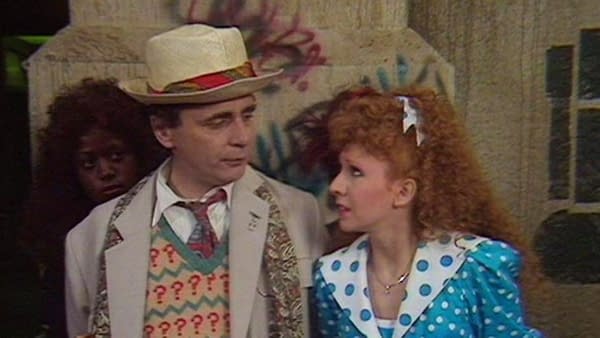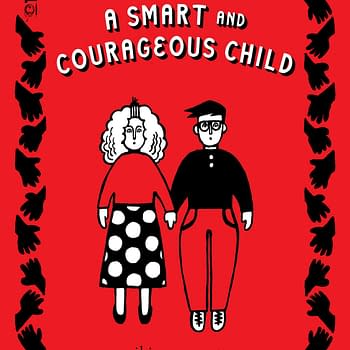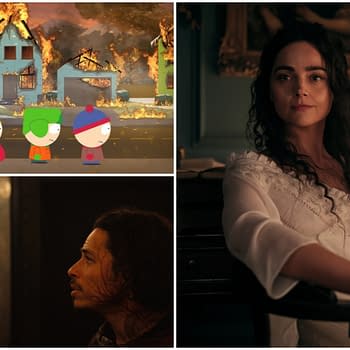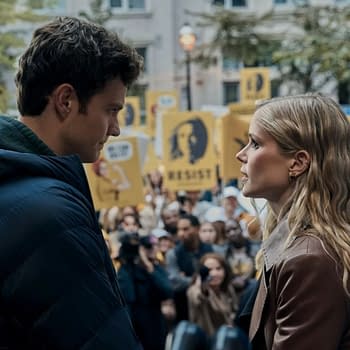Posted in: BBC, Doctor Who, TV | Tagged: Andrew Cartmel, bbc, bonnie langford, doctor who, paradise towers, Richard Briers, russell t davies, steven moffat, sylvester mccoy
Doctor Who: How "Paradise Towers" Influenced Russell T Davies NuWho
Doctor Who Series 24 might be the most reviled season of the classic show, two seasons before it was cancelled by the BBC in 1987. It was Sylvester McCoy's first season as the Seventh Doctor and the ratings were dropping, the budget had been reduced and in hindsight, it was the beginning of the end of the show. The second story of the season, "Paradise Towers" was often picked out for its cheap look and reputedly cheesy script, but it was actually the beginning of the influence on Russell T. Davies when he brought the show back in 2005.

The first story of the season where the Doctor regenerates and has to deal with the Rani's latest evil scheme was actually a banked script. New story editor Andrew Cartmel disliked it because he felt it was generic Doctor Who and didn't really say anything. "Paradise Towers" was the first script he commissioned that began to put his more political agenda and more modern influences on display, even if he didn't always get to do everything he wanted. "Paradise Towers" sees the Doctor and Mel (Bonnie Langford) arriving at a near-future Earth to visit the reputedly luxurious Paradise Towers because Mel wants to use the swimming pool on the top floor. Instead of a leisurely time in the spa, they discover a dystopian society contained in the mega apartment complex where the halls and public spaces are dominated by warring teenage gangs that hunt each other, residents that stay in their flats out of fear and have resorted to cannibalism, inept security guards headed by an inept petty fascist (Richard Briers), cleaner robots turned hunter-killers and an alien entity that designed the building.

"Paradise Towers" was one of the few Doctor Who stories intended to be a comedy, which is one of the things fans hated about it. Watching it now, its comedic tone is surprisingly close to the satirical aspects of Russell T. Davies and Steven Moffat's runs. The Seventh Doctor already began to hint at the darker, more mysterious personality he would show in the next two seasons when he uses his bumbling façade to subtly charm his way into the teenage gangs' good graces and manipulate them into declaring a truce and co-operate with each other. Mel's made a fum companion for the Doctor because she's so unflappably chipper. The cannibalistic old ladies who try to have her for dinner are played by popular soap actresses in another instance of Doctor Who stunt-casting, as is Richard Briers, a popular sitcom actor who had been a household name in England since the Sixties.

This was the first time Doctor Who had the tone of a 2000 AD comic story with its overt satire cooked into a Science Fiction framework, lifting from A Clockwork Orange and J. G. Ballard's novel High Rise. Instead of lifting from classic literature and gothic horror movies, Cartmel and writer Stephen Wyatt were lifting from more recent cult rather than mainstream influences. This began the era of Doctor Who writers who read comics & lots of recent Science Fiction and were openly influenced by Alan Moore. The tone of the acting is openly goofy, with Briers reportedly ignoring any direction and playing his petty Hitler-wannabe as overtly comic in his ineptitude, practically letting his Hitler mustache do the walking. The script has to make do with a reduced budget and the story is confined to a bunch of corridors and the cheapest-looking sets the show had ever seen. While fans moaned about that, it looks like part of the comedic tone, making the story feel like an extended comedy sketch. You can spot the influence of "Paradise Towers" in Russell T. Davies's story "Gridlock" about a dystopian future Earth stuck in perpetual rush hour and more of Steven Moffat's stories than one can count. Once again, Time has been kind to an older reviled story.













